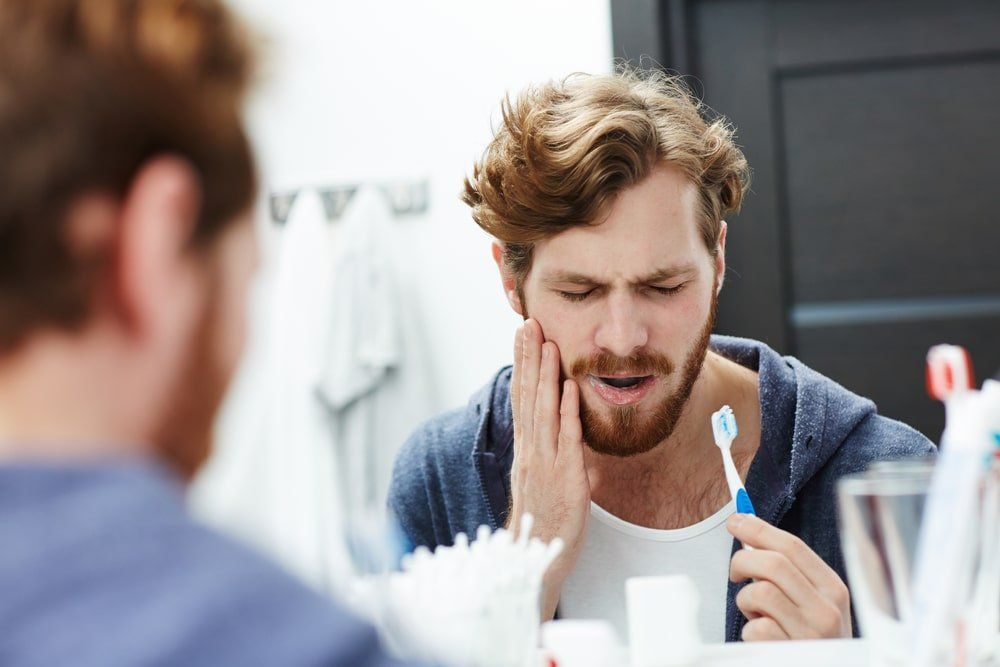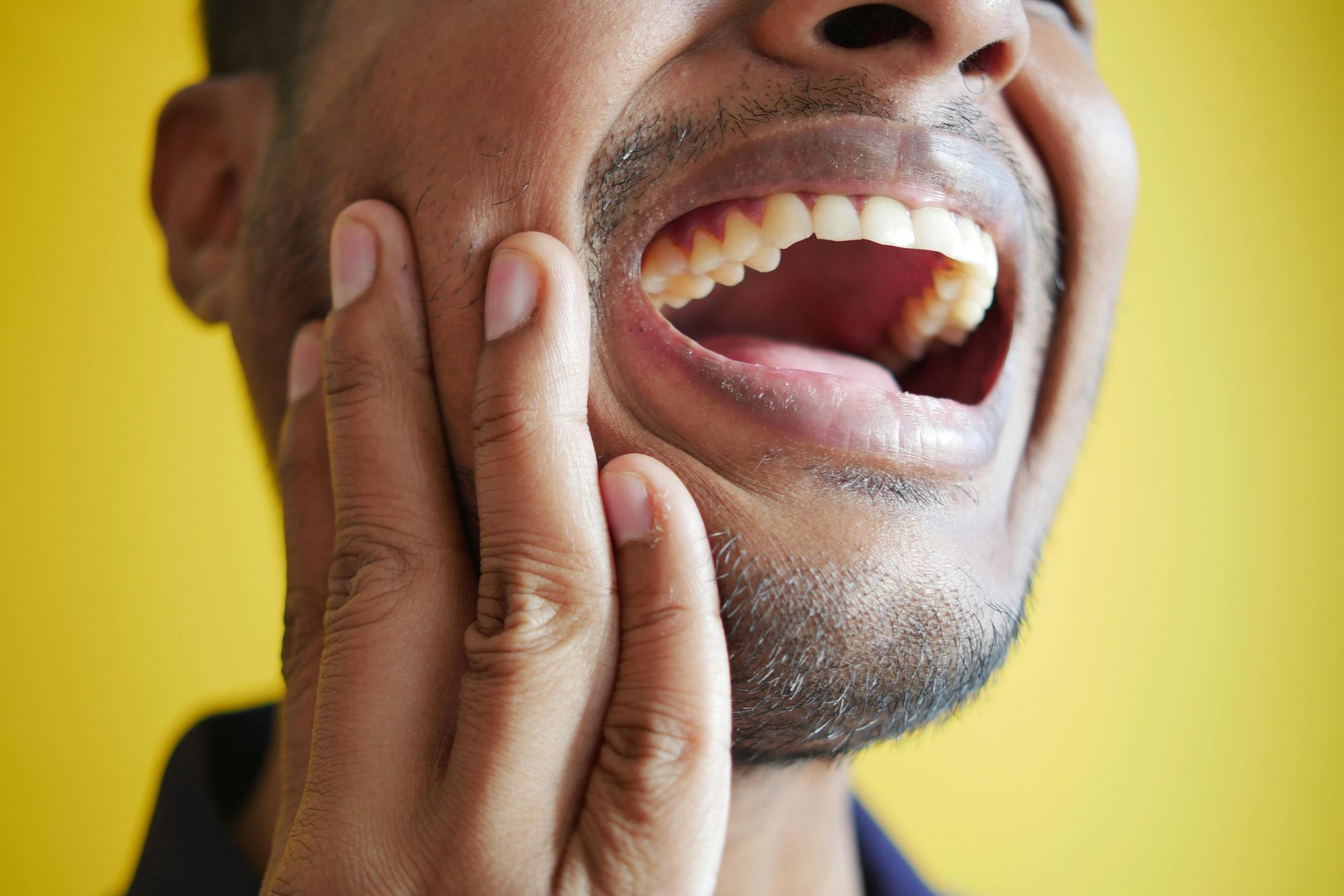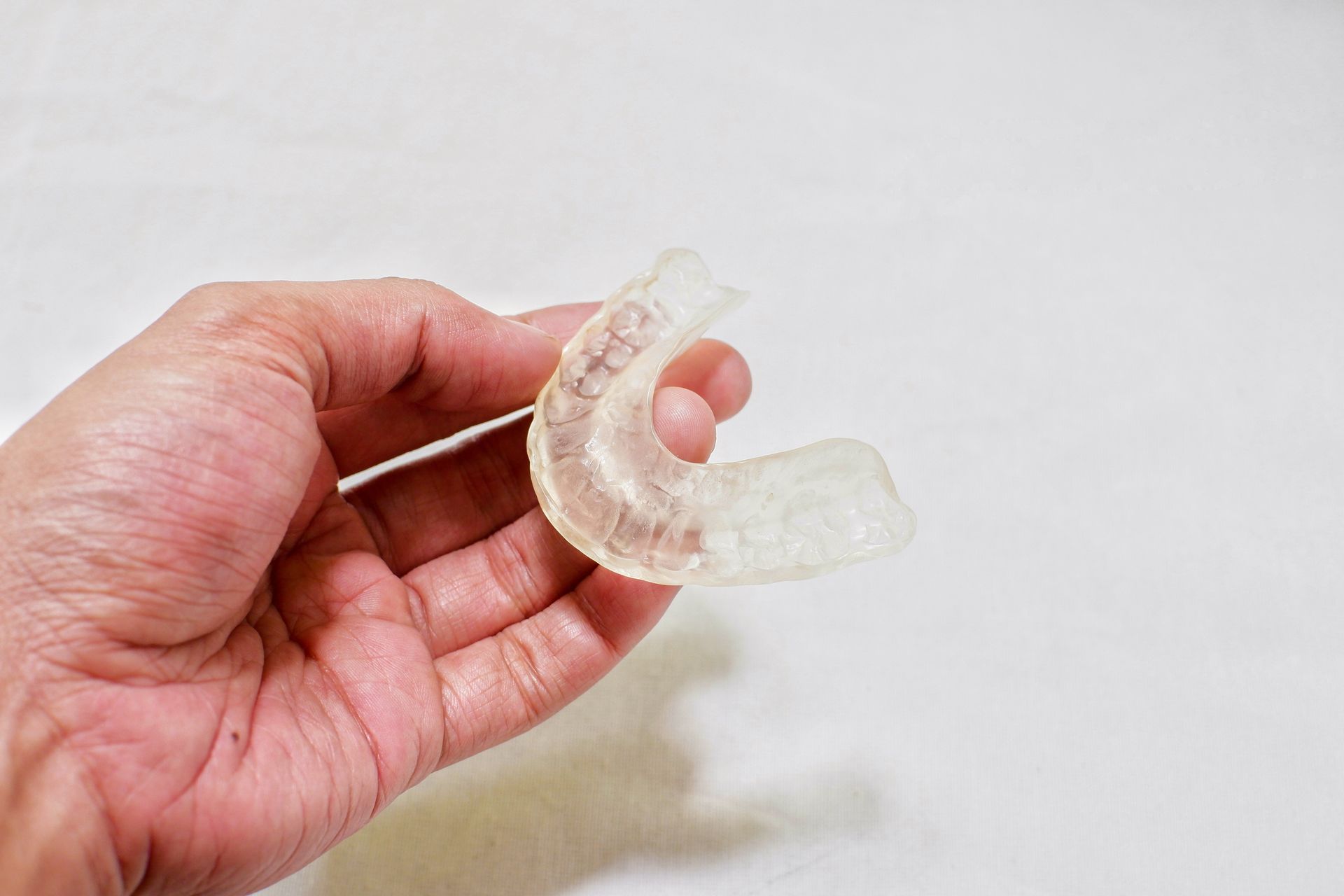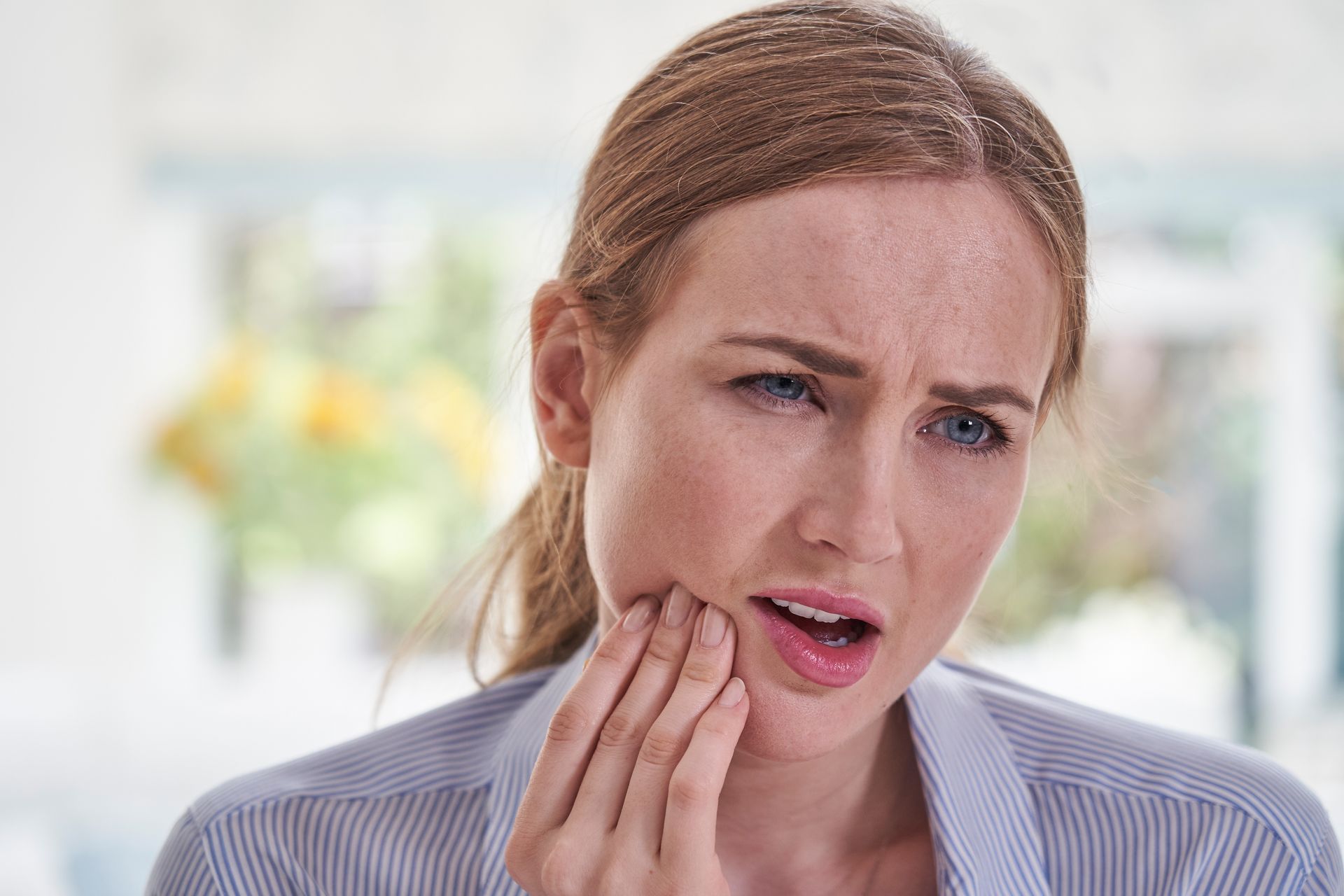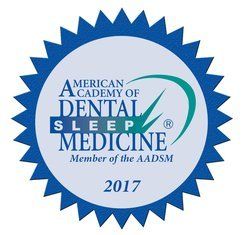Does TMJ Cause Tooth Pain and Sensitivity? What You Need to Know
Updated: 03/26/2025
Disorders of the TMJ can cause an array of cascading side effects and symptoms, from eroded enamel, broken crowns and fillings, cracked or chipped teeth, and facial pain. They can also cause tooth pain and sensitivity. However, while tooth pain and sensitivity resulting from a cavity or damaged tooth can typically be corrected with a dental restoration, tooth pain and sensitivity caused by TMJ disorders may require a more comprehensive treatment plan for better and longer-lasting relief.
Toothaches and sensitivity are unfortunately common for adults. In the U.S., 40% of adults say they have had pain in their mouth within the last year. Tooth pain is most often caused by cavities, a cracked or broken tooth, or worn tooth enamel that exposes the dentin, making the tooth more sensitive to hot and cold temperatures.
Each of these conditions can be the result of factors unrelated to the temporomandibular joint (TMJ). However, disorders of the TMJ (TMD), can also trigger damage to your teeth, resulting in tooth pain and sensitivity. Alternatively, those with a TMJ disorder may be feeling pain in their teeth, but have no actual tooth damage; the tooth pain may be coming from other areas of your neck or jaw.
Problems with your teeth and TMJ can be complex and multifaceted, so distinguishing between the different types of tooth pain can be difficult. TMJ specialists Dr. Katherine Phillips and Dr. YC Joseph FischerHahm of Restore TMJ & Sleep Therapy in The Woodlands can help get to the source of your tooth pain or sensitivity and address the cause of it. They have committed their practice to offering the best possible solutions for managing and relieving discomfort associated with TMJ disorders and helped thousands of patients in and around The Woodlands live pain-free.
What is a TMJ Disorder?
When people refer to TMJ, they often are talking about the pain in their temporomandibular joint (TMJ). This pain may be caused by a TMJ disorder (TMD), which is a condition that affects the muscles and joints in the jaw. The temporomandibular joint connects your jawbone to your skull and allows you to open and close your mouth, chew, speak, and perform other jaw movements. When there are problems with the joint, it can lead to headaches and pain in the face, neck, and jaw.
TMJ disorders can develop as the result of various causes such as an injury to the jaw, arthritis, genetics, or teeth grinding or clenching. Symptoms may include jaw pain, aching in your cheeks or near your ear, and difficulty chewing or opening and closing your mouth. Some people may also hear clicking or popping noises. Because these symptoms can also result from other conditions, it is important to consult with a medical professional such as a TMJ specialist to determine the cause and appropriate treatment.
The Impact of TMJ Disorders on Overall Health
TMJ disorders not only cause pain in the jaw but can also have a ripple effect on your overall health.
Sleep
One common issue is disrupted sleep. The discomfort and pain associated with TMD can make it difficult to get a good night’s rest. Poor sleep quality can then lead to daytime fatigue and a decrease in your overall well-being, creating a cycle of discomfort that’s hard to break.
Nutrition
In addition to sleep problems, TMJ disorders can impact how and what you eat. Difficulty chewing can lead to changes in diet, often resulting in poor nutrition.
Mental Health
The constant pain and discomfort from TMD can also contribute to stress, anxiety, and even depression.
Chronic pain
TMJ disorders are often linked to other painful and chronic issues such as headaches, neck pain, and earaches.
TMJ Disorders and Tooth Pain
Tooth pain is a common side effect of a TMJ disorder. When the TMJ is injured or irritated, it often leads to jaw misalignment or abnormal movement patterns, which can put imbalanced pressure on the teeth. This uneven pressure can wear down tooth enamel, cause teeth to shift, and even lead to cracks or chips, all of which tend to be precursors to significant tooth pain and sensitivity. Additionally, the muscles involved in TMJ disorders can radiate pain to surrounding areas, making it feel as though the pain is in your teeth when it is actually coming from your jaw.
Another way TMJ disorders can cause tooth pain is through bruxism, a condition in which you subconsciously grind or clench your teeth. Bruxism most often occurs during sleep, but can also present while you’re awake. The constant grinding can cause fractures or cracks in the teeth, wear down the enamel, damage existing dental work, and cause increased tooth sensitivity, especially to hot and cold temperatures.
Since TMJ-related tooth pain can mimic other dental issues, it’s important to get a proper diagnosis to ensure that the treatment addresses the root cause of your pain and doesn’t just mask the symptoms.
Treatments for TMD Pain
Managing TMD pain often requires a combination of home remedies and professional treatments. The approach you take will depend on the severity of your symptoms and how much they are impacting your daily life. While some people find relief with simple lifestyle changes, others may need more specialized care from a professional such as a TMJ specialist.
Home Remedies and Lifestyle Changes to Manage TMJ Pain and Tooth Sensitivity
For those with mild to moderate symptoms, there are several home remedies and lifestyle adjustments that can provide relief. These approaches focus on reducing tension in the jaw, improving posture, and managing stress—all of which can contribute to TMJ pain.
- Massage. Gentle massage of the jaw muscles can reduce tension and relieve pain.
- Home exercises. Specific jaw exercises can strengthen and stretch muscles, which improves jaw movement and reduces discomfort.
- Hot or cold compresses. Applying heat or cold can reduce inflammation and soothe aching muscles.
- Stress management. Since stress often aggravates TMD symptoms, techniques like deep breathing, meditation, or yoga can be beneficial.
- Posture. Maintaining good posture, especially while sitting or working at a desk, can help reduce strain on the jaw and neck muscles.
Treating TMJ Tooth Pain and Sensitivity with a TMJ Specialist
For more severe cases or when home remedies aren’t enough, seeking professional treatment is essential. Professionals such as TMJ specialists can offer a range of therapies that target the underlying causes of TMD, helping to provide more long-term relief.
- Splints and orthotics. These custom-made devices help provide space to allow the jaw joint to heal while reducing the loading force.
- Medications. Anti-inflammatory drugs, muscle relaxants, or other medications may be prescribed to reduce pain and inflammation.
- Physical therapy. A physical therapist can guide you through specific exercises and treatments to improve jaw function and range of motion and relieve pain.
- Surgery. In rare cases where other treatments have failed, surgical options may be considered to correct structural issues in the jaw.
4 Ways to Distinguishing TMJ Pain from Other Tooth Pain
TMJ pain can be easily mistaken for a toothache or other tooth pain. Dental issues that cause toothaches, such as cavities, cracks, or chips, are usually visible when inspected by a dental professional and generally have specific symptoms.
If you’re having tooth pain, it’s important to visit your dentist. However, if you can’t see your dentist right away, you might be able to figure out the source of your pain by examining your teeth and considering your symptoms.
Here are 4 steps to help you determine whether your pain is due to tooth damage or TMJ issues.
- Examine the inside of your mouth for visible signs of cavities, chips, or cracks that could be causing you discomfort.
- Gently test the painful tooth with a toothpick or a similar tool to see if the pain intensifies sharply.
- Pay attention to any sudden sensitivity to heat, cold, or sugary foods—this often suggests a cavity.
- Try resting your jaw or gently massaging the temporomandibular joint. If this reduces your discomfort, the pain may be related to TMJ.
TMJ disorders can cause widespread facial pain, including tooth pain, making it difficult to pinpoint the exact cause. If you suspect you have a cavity or other dental damage, a visit to your dentist is vital. However, if you’ve had dental treatment and continue to experience unexplained tooth pain, it could be related to a TMJ disorder. Although TMJ disorders can cause tooth pain, they are treatable. Often, therapies like splints, oral appliances, or medications provide effective relief.
Trust the TMJ Specialists at Restore TMJ & Sleep Therapy for Your TMJ Tooth Pain and Sensitivity
TMJ disorders can be complex and challenging to manage, especially when they lead to confusing symptoms like tooth pain and sensitivity. Whether you’re experiencing tooth pain due to TMJ or another dental issue, getting a proper diagnosis is a key first step for determining the right treatment.
If you suspect that your tooth pain might be related to a TMJ problem, don’t wait to seek help. Schedule an appointment with Dr. Katherine Phillips or Dr. YC Joseph FischerHahm at REstore TMJ & Sleep Therapy to get expert advice and personalized treatment options, and let our team of specialists help you find lasting relief.
-2700x842-1920w.png)




